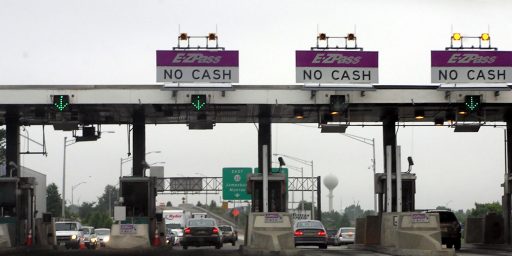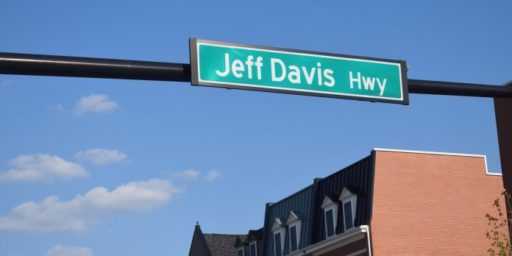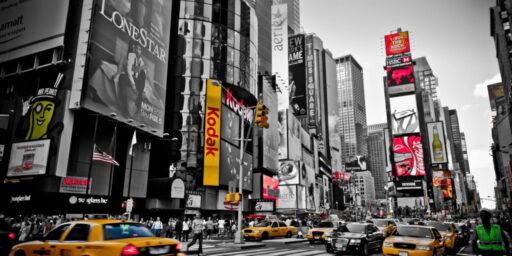Toll Roads Catching On
Paying on the Highway to Get Out of First Gear (NYT | RSS)
It is a California still life. In this land of mobile ambition and instant communities, life is on hold in the parking lot that is the Riverside Freeway, 10 miles or more going nowhere at all hours of the day on one of the most congested auto corridors in the world. But like a mirage in the exurban desert, a narrow river of traffic moves swiftly down the middle of this highway. The fast lanes, the 91 Express, are sometimes called Lexus lanes, first class on asphalt. They can turn a two-hour commute to work into a 30-minute zip. For a solo driver, on-time arrival comes with a price: nearly $11 per round trip, a toll collected through electronic signals.
The freeway in places is no longer free. From the backed-up pools of frustration in Chicago’s adjacent counties, to the farthest Virginia fringes of the commute to Washington, to Texas, where plans are under way to build a 4,000-mile network of toll roads, the United States has outgrown its highway system. But state and federal governments, beset by deficits, say they have barely enough money to service the existing system, let alone build new roads. As a result, nearly two dozen states have passed legislation allowing their transportation systems to operate pay-as-you-go roads, and in many cases, letting the private sector build and run these roads.
Social engineering is merging with traffic engineering, creating new technologies that charge people a variable toll based on how many cars are on the road – known as congestion pricing – or reduce toll rates for high occupancy to encourage car-pooling. The White House wants to allow states to charge user fees for virtually any stretch of an interstate. It is shaping up as one of the biggest philosophical changes in transportation policy since the toll-free interstate highway system was created under President Dwight D. Eisenhower in 1956. It mirrors changes taking place overseas as well. London began charging tolls two years ago to enter the center of the city during weekday business hours.
This idea would have seemed bizarre to me before moving to the D.C. area a couple years ago. In most of the country, being asked to pay to drive down the road would have citizens up in arms. Now, I routinely pay tolls to drive to work and sometimes, like this morning, pay for the privilege of getting stuck in bumper-to-bumper traffic on said toll roads when there are accidents or weather-related delays. Unfortunately, the alternative “free” routes are even more clogged.
John Cole observes, “I guess this means the old saying ‘So and so is going places’ to refer to someone who is becoming wealthy and famous is really going to take on a whole new meaning.” Indeed!
Susan Madrak blames it all on President Bush: “More of the Right Type of social engineering the Republicans love. Choke off the highway funds so states are forced to privatize roads, and it’s a frigging libertarian wet dream.”
While I’m squeamish about the idea that the wealthy should be able to escape such drudgeries of everyday life as traffic,* I don’t see any great alternatives. In the areas where HOT lanes are going to make economic sense, there’s just no way to build roads fast enough. Road construction actually adds delays in the short run and any longer run gains are quickly eaten up by people moving further out to take advantage of the temporarily shorter commutes.
Better public transportation, including magnetic trains and other technological innovations, would be great but they’re phenomenally expensive and take years to build. Locally, they’re finally going to expand the Metro rail system out to the Dulles Corridor, a mere 15 miles from the current westernmost point. It’s going to cost several billion dollars and take several years. By the time it’s built, the Metro area will have expanded to West Virginia and we’ll be no further ahead than we are now.
Having those who can afford it pay exorbitant sums for the priviledge of moving faster means more money for solving the problem, plus a slight lessening of the burden for the rest of us. It’s not an ideal solution but it’s better than nothing.
*Indeed, I took the contrary position in December 2003, before I actually had to routinely deal with a commute inside the Beltway. Perhaps this is a “where you stand is where you sit” issue.





San Diego had some rush-hour only (direction changed morning and afternoon and access was blocked other times), pay-to-use express lanes when I lived there in the early- to mid-90s. IOW, Bush has absolutely nothing to do with this (nit that that’s ever stopped a Bush-basher before).
And it’s a great idea. The people who benefit pay, those who don’t think it’s worth it to save 1 1/2 hours don’t. I’d happily pay it myself since 1 1/2 hours of my time is worth more to me than 11 bucks, but if others don’t want to, they aren’t forced to. I haven’t got any numbers, but I’d be willing to bet that it actually goes the other way and the high fees to use these lanes exceed the additional costs of having them, which, if correct, would mean that the people using them are subsidizing everyone else).
The Riverside Freeway HOT lanes have been there since the early 90s. I was one of those who were usually stuck in the free lanes watching the Lexuses passing by.
A lot of us here in CA would gladly pay to use these roads. But we have to battle endlessly with the “elistist” label. We are constantly told that “the poor” won’t be able to afford the tolls. So? Some poor people don’t have cars. So what? Some poor can’t afford $900,000 condos. That doesn’t mean we don’t build them for those who can. We would also, I believe, be willing to pay somewhat higher taxes for highway construction if they actually got built! Every
time someone proposes a new highway, it’s years of legal hassles with “environmentalists” who find another frog. Or anti-growth Nazis who say we should all live in 500 sq ft apartments next to train stations.
Actually, the Nazis built the autobahn, so be blaming them for this mess.
shoulda said, don’t be blaming them for this mess.
Several years to complete the Dulles Metro extension? More like many, many, many years! Last time I read it was scheduled to be completed in 2011.